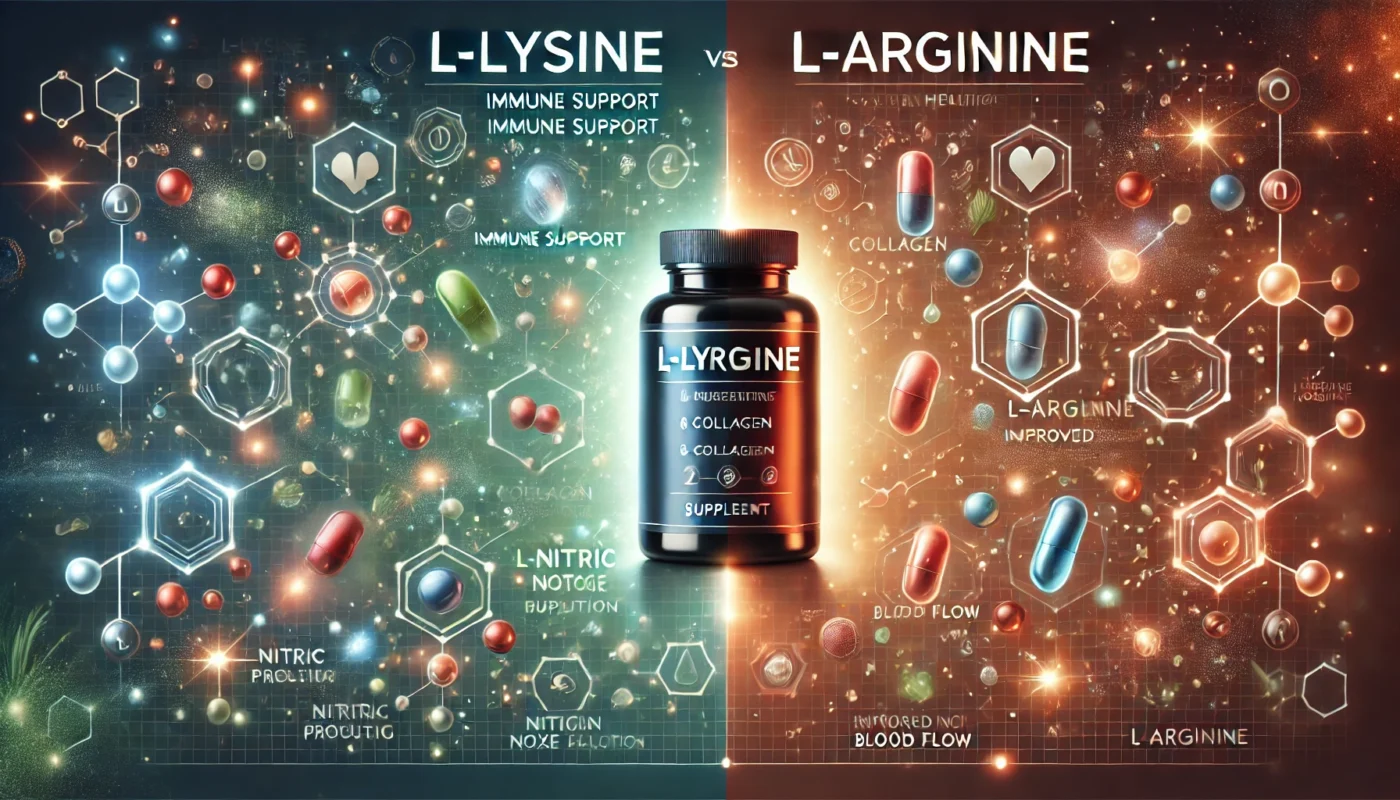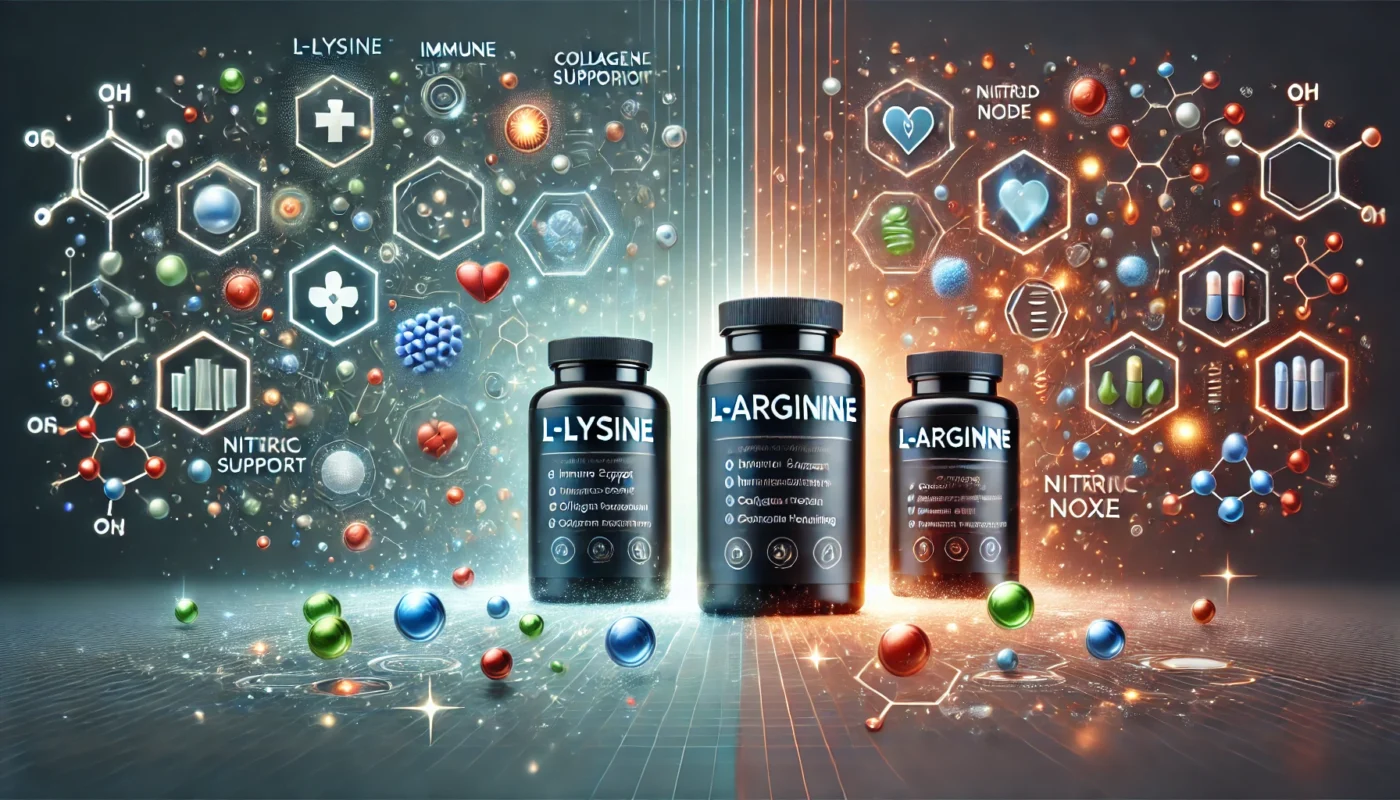Amino acids are the building blocks of proteins, playing vital roles in nearly every physiological function. Among them, L-lysine and L-arginine stand out due to their significant contributions to immune health, muscle repair, and cardiovascular benefits. Though both are essential for optimal health, their unique properties and mechanisms of action set them apart, making each more suitable for specific health goals. This article delves into the differences between L-lysine and L-arginine, offering evidence-based insights to help you determine which amino acid best aligns with your needs.
You May Also Like:
Are You Getting Enough L-lysine? Signs of Deficiency and How to Correct It
L-lysine: The Key to Optimizing Your Health Supplement Routine
L-lysine vs. L-arginine: Which Amino Acid is Best for Your Health Goals? is an original (HSLHealing) article.
What Are L-lysine and L-arginine?
L-lysine
L-lysine is an essential amino acid, meaning the body cannot produce it and must obtain it through diet or supplementation. It plays a central role in collagen synthesis, aiding in tissue repair and wound healing. Additionally, L-lysine has antiviral properties and supports immune system function by inhibiting the growth of certain pathogens, such as herpes simplex virus (HSV).
Key dietary sources include meat, poultry, fish, eggs, dairy, and legumes. Supplemental forms are available for those with increased needs, such as athletes or individuals recovering from injuries.

L-arginine
L-arginine is a conditionally essential amino acid, meaning the body produces it under normal circumstances but may require additional intake during stress or illness. It is a precursor to nitric oxide (NO), a molecule critical for vasodilation, cardiovascular health, and immune regulation. L-arginine also supports protein synthesis, making it essential for muscle repair and growth.
Dietary sources include nuts, seeds, seafood, meat, and legumes. Like L-lysine, it is widely available as a dietary supplement.
Immune Health: L-lysine vs. L-arginine
L-lysine’s Role in Immunity
L-lysine has been studied extensively for its antiviral properties, particularly against the herpes simplex virus (HSV). Research shows that L-lysine supplementation can reduce the frequency, severity, and duration of HSV outbreaks. A 1984 study published in Dermatologica found that daily doses of 1,000 mg of L-lysine significantly reduced the recurrence rate of HSV symptoms compared to a placebo.
L-lysine also contributes to immune function by supporting collagen production, which fortifies skin and mucosal barriers against infection.
L-arginine’s Immune Support
L-arginine boosts immune health by serving as a precursor to nitric oxide, a molecule essential for immune cell signaling. Nitric oxide helps regulate the activity of macrophages and T-cells, which are crucial for defending against infections. A study in The Journal of Nutrition (2012) highlighted L-arginine’s ability to enhance wound healing and immune response during illness or injury.
However, in the context of viral infections like HSV, L-arginine may promote viral replication, potentially exacerbating outbreaks. This makes L-lysine the preferred amino acid for individuals with such conditions.

Muscle Repair and Recovery
L-lysine: The Collagen Builder
L-lysine plays a pivotal role in collagen formation, making it essential for muscle repair and recovery. Collagen is the most abundant protein in connective tissues, including muscles, tendons, and ligaments. A study in The Journal of Biological Chemistry (1996) demonstrated that L-lysine is a critical cofactor in collagen cross-linking, enhancing the strength and resilience of connective tissues.
Moreover, L-lysine supports calcium absorption, indirectly benefiting muscle contraction and bone health.
L-arginine: The Protein Synthesizer
L-arginine is a key player in protein synthesis, promoting muscle repair and growth after exercise or injury. Its role in nitric oxide production enhances blood flow to muscles, delivering oxygen and nutrients essential for recovery. A 2010 study in Amino Acids found that L-arginine supplementation improved muscle protein synthesis and reduced markers of muscle damage in athletes after intense training.
Due to these properties, L-arginine is particularly beneficial for bodybuilders, endurance athletes, and individuals recovering from surgery or injuries involving muscle tissue.

Cardiovascular Benefits
L-arginine: The Heart Protector
L-arginine’s ability to produce nitric oxide makes it a standout amino acid for cardiovascular health. Nitric oxide relaxes blood vessels, reducing blood pressure and improving circulation. A meta-analysis published in Hypertension (2017) revealed that L-arginine supplementation significantly lowered systolic and diastolic blood pressure in hypertensive patients.
Additionally, L-arginine has been shown to improve endothelial function, reduce arterial stiffness, and enhance exercise tolerance in individuals with cardiovascular conditions.
L-lysine: A Supportive Role
While L-lysine is not directly involved in nitric oxide production, it supports cardiovascular health by aiding in the production of carnitine, a molecule that helps transport fatty acids into cells for energy production. This process is vital for maintaining healthy cholesterol levels and preventing the accumulation of fatty deposits in arteries.

Synergistic Use of L-lysine and L-arginine
Though L-lysine and L-arginine have distinct roles, they can work synergistically in certain situations. For instance, their combined use in wound healing has shown promising results. A 2019 clinical trial in Surgical Science reported that supplementation with both amino acids accelerated tissue regeneration and reduced recovery times in patients undergoing surgery.
However, balance is crucial. L-arginine’s ability to stimulate viral replication may counteract L-lysine’s antiviral effects, particularly in individuals prone to herpes outbreaks. Consulting a healthcare provider can help determine the appropriate ratio of these amino acids for specific health goals.
Choosing the Right Amino Acid for Your Health Goals
When to Choose L-lysine
- Immune health: Ideal for individuals with viral infections like HSV.
- Wound healing: Essential for tissue repair and collagen production.
- Bone and muscle support: Supports calcium absorption and collagen synthesis.
When to Choose L-arginine
- Cardiovascular health: Best for improving circulation and reducing blood pressure.
- Muscle repair: Beneficial for athletes and those recovering from injuries.
- Immune modulation: Enhances nitric oxide production for immune signaling.

Potential Side Effects and Precautions
L-lysine
L-lysine is generally well-tolerated, but excessive doses (over 3,000 mg per day) may cause gastrointestinal discomfort, including nausea and diarrhea. Individuals with kidney or liver conditions should use L-lysine supplements cautiously.
L-arginine
L-arginine is also safe for most individuals when taken in appropriate doses (2,000–6,000 mg per day). However, it may interact with certain medications, such as blood pressure drugs and anticoagulants. Additionally, individuals with herpes infections should avoid high doses of L-arginine, as it may trigger outbreaks.
Conclusion
L-lysine and L-arginine are powerful amino acids, each with unique benefits that cater to different health goals. L-lysine shines in supporting immune health, wound healing, and collagen synthesis, while L-arginine excels in promoting cardiovascular health, muscle repair, and immune signaling. Choosing between the two—or using them synergistically—depends on individual needs and health conditions.
By understanding their distinct roles and mechanisms, you can harness the benefits of L-lysine and L-arginine to optimize your overall health and well-being.

References
- Relation of arginine-lysine antagonism to herpes simplex growth in tissue culture. Retrieved from: https://pubmed.ncbi.nlm.nih.gov/6262023/
- L-arginine in the management of cardiovascular diseases. Retrieved from: https://pubmed.ncbi.nlm.nih.gov/11408995/
- Biochemistry, Collagen Synthesis. Retrievd from: https://www.ncbi.nlm.nih.gov/books/NBK507709/
- Conformational requirement for lysine hydroxylation in collagen. Structural studies on synthetic peptide substrates of lysyl hydroxylase. Retrieved from: https://pubmed.ncbi.nlm.nih.gov/1744090/
- Arginine metabolism: nitric oxide and beyond. Retrieved from: https://pubmed.ncbi.nlm.nih.gov/9806879/
- Arginine and Lysine Supplementation Potentiates the Beneficial β-Hydroxy ß-Methyl Butyrate (HMB) Effects on Skeletal Muscle in a Rat Model of Diabetes. Retrieved from: https://pubmed.ncbi.nlm.nih.gov/38004100/
- The role of amino acids in skeletal muscle health and sarcopenia: A narrative review. Retrieved from: https://pubmed.ncbi.nlm.nih.gov/39433511/
- Effect of oral L-arginine supplementation on blood pressure: a meta-analysis of randomized, double-blind, placebo-controlled trials. Retrievd from: https://pubmed.ncbi.nlm.nih.gov/22137067/
Important Note: The information contained in this article is for general informational purposes only, and should not be construed as health or medical advice, nor is it intended to diagnose, prevent, treat, or cure any disease or health condition. Before embarking on any diet, fitness regimen, or program of nutritional supplementation, it is advisable to consult your healthcare professional in order to determine its safety and probable efficacy in terms of your individual state of health.
Regarding Nutritional Supplements Or Other Non-Prescription Health Products: If any nutritional supplements or other non-prescription health products are mentioned in the foregoing article, any claims or statements made about them have not been evaluated by the U.S. Food and Drug Administration, and such nutritional supplements or other health products are not intended to diagnose, treat, cure, or prevent any disease.

